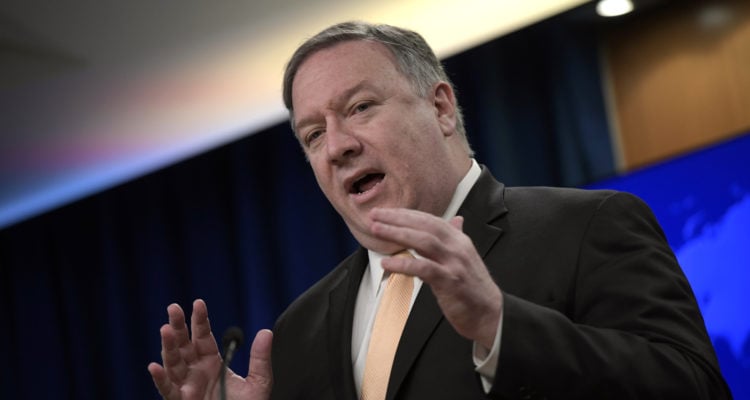Announcing the step, Secretary of State Mike Pompeo said no more sanctions waivers would be granted when the current batch expire on May 2, choking off Iranian income that had been more than $50 billion a year.
By Associated Press
The Trump administration said Monday that it will no longer exempt any countries from U.S. sanctions if they continue to buy Iranian oil, stepping up pressure on Iran in a move that primarily affects the five remaining major importers: China and India and U.S. treaty allies Japan, South Korea, Turkey.
President Donald Trump made the decision as part of the administration’s “maximum pressure” campaign on Iran that aims to eliminate all of its revenue from oil exports that the U.S. says funds destabilizing activity throughout the Middle East and beyond.
“This decision is intended to bring Iran’s oil exports to zero, denying the regime its principal source of revenue,” the White House said in a statement.
Announcing the step, Secretary of State Mike Pompeo said no more sanctions waivers would be granted when the current batch expire on May 2, choking off Iranian income that had been more than $50 billion a year.
“The goal remains simply: To deprive the outlaw regime of the funds that it has used to destabilize the Middle East for decades and incentivize Iran to behave like a normal country,” Pompeo told reporters at the State Department.
The administration had granted eight waivers when it re-imposed sanctions on Iran in November after Trump pulled the U.S. out of the landmark 2015 nuclear deal. The waivers were issued in part to give those countries more time to find alternate energy sources but also to prevent a shock to global oil markets from the sudden removal of Iranian crude. Three of those waivers, for Greece, Italy and Taiwan, are no longer needed because they have all halted their imports of Iranian oil.
But the other five continue to import Iranian oil and had lobbied for their waivers to be extended. NATO ally Turkey has made perhaps the most public case for an extension, with senior officials telling their U.S. counterparts that Iranian oil is critical to meeting their country’s energy needs. They have also made the case that as a neighbor of Iran, Turkey cannot be expected to completely close its economy to Iranian goods.
Turkish Foreign Minister Mevlut Cavusoglu criticized the decision, saying it “will not serve regional peace and stability.”
In a message posted on Twitter Monday, Cavusoglu said: “Turkey rejects unilateral sanctions and impositions on how to conduct relations with neighbors.” Cavusoglu added the decision would harm the people of Iran. He tagged the U.S. State Department and U.S. Secretary of State Mike Pompeo on his tweet.
China, one of Iran’s largest customers, slammed the step, calling it more evidence of U.S. “unilateral sanctions and long-arm jurisdiction.” China, which relies on imports for about half of its oil, could present the toughest diplomatic challenge for the U.S. in trying to enforce its sanctions.
Those arguments fell on deaf ears within the administration.
“We will no longer grant any exemptions,” Pompeo said. “We are going to zero, we’re going to zero across the board.”
Iran brushes off decision
Iran brushed off the decision, calling the sanctions “illegal.”
“Regarding the illegal status of the sanctions, the Islamic Republic of Iran basically has not seen and does not see any worth and validity for the waivers,” the foreign ministry said in a statement carried by the official IRNA news agency. It said Iran has intensified consultations with its “European and international partners” and that a “necessary decision” would be announced later, without elaborating.
Earlier, Iran reiterated its long-running threat to close the Strait of Hormuz if it’s prevented from using the crucial waterway in the Persian Gulf through which about a third of all oil traded at sea passes.
Left unclear by the U.S. decision is whether the five countries will face immediate American sanctions if they continue to take delivery of Iranian oil after the waivers expire.
Two senior U.S. officials — Special Representative for Iran Brian Hook and Assistant Secretary of State for Energy Resources Frank Fannon — refused to comment on whether any of them would be given additional time to complete purchases made prior to May 2 or allowed to use money already set aside for purchases after that date without penalty. Both said questions about such provisions were “hypothetical,” suggesting that some accommodation may be possible.
Fannon said the U.S. did not expect any sharp spike in oil prices or any significant reduction in the global supply of oil, given production increases by other countries, including the U.S. itself, Saudi Arabia and the United Arab Emirates.
Netanyahu praises move
“The decision of President Trump and the American administration is of great importance in increasing the pressure on the Iranian terrorist regime. We stand alongside the determination of the US against the Iranian aggression and this is the right way to stop it,” Prime Minister Benjamin Netanyahu stated.





